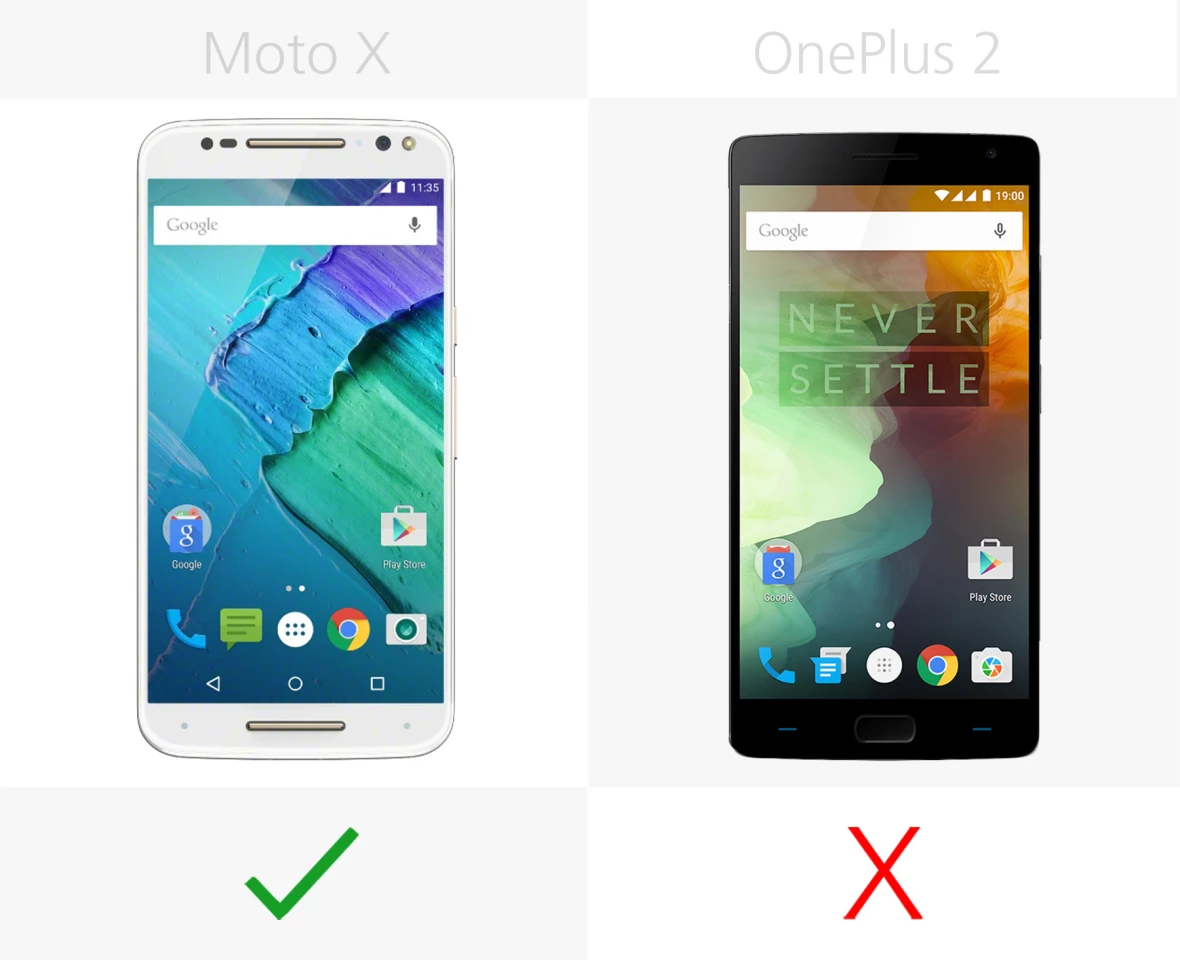It might be a coincidence that the new Moto X Style (known as the Pure Edition in the U.S.) launched about 12 hours after the OnePlus 2, but it's also fitting, as the two phones have quite a bit in common. Let's compare the two value-focused Android flagships.
Size

Dimensions are similar, with the Moto X coming out just 1 percent taller and wider.
While both phones are high-end, thickness is one area where neither is pushing any boundaries. Both have rounded backs, which makes them look a bit thicker on paper than they'll feel in hand, but they still lag far behind razor-thin competitors like the latest iPhones and Samsung Galaxy S6.
Weight

The slightly larger Moto X Pure Edition is also slightly heavier (2 percent heavier, to be exact).
Build (frame)

Both phones have metal frames.
Build (backing)

Here's another striking resemblance between the two, as you can pick from multiple materials – including natural wood options – for the backs of both handsets.
The big difference is that you need to make your material decision on the Moto X before buying (it's permanent). Meanwhile the OnePlus 2 ships by default with the sandstone backing, but you can buy the other backs for US$27 each, and swap them out yourself.
Display size

The Moto X gives you a 7 percent bigger display than the OnePlus 2.
Display resolution

At the OnePlus 2's launch event, the company was defensive about sticking with a 1080p display, suggesting that anything higher than that (like the Moto X's Quad HD) is gimmicky overkill that doesn't add to the experience of using a phone.
Quad HD panels don't change how you use a phone, and we agree that 1080p screens are plenty sharp. But we do find that Quad HD screens add an eye candy factor that makes for a significant enough upgrade.
Display type

This is the first Moto X that didn't use an AMOLED panel, switching instead to a TFT LCD.
Navigation buttons

Like with last year's OnePlus One, the OnePlus 2 lets you choose between using capacitive (below screen) navigation buttons or onscreen virtual keys.
Fingerprint sensor

OnePlus added a touch-based fingerprint sensor to the 2.
Storage

Both handsets start with 16 GB storage, but the OnePlus 2's second tier gives you twice the space of the second-tier Moto X.
MicroSD

The Moto X Style/Pure Edition does, however, let you pop in a microSD card to complement that.
Processor

Both handsets have speedy Qualcomm processors. It's possible the OnePlus 2's Snapdragon 810 will benchmark a little higher, but that doesn't necessarily mean much (if anything) in experience. Stay tuned for our full reviews.
RAM

The entry-level OnePlus 2 has 3 GB of RAM, but that jumps up to a laptop-like 4 GB in the 64 GB model.
Battery

The OnePlus 2 has a slightly larger battery, but you'll need to wait for our review and battery benchmark to know if that means anything.
Removable battery

Neither handset lets you remove its battery, despite the fact that you can swap back covers on the OnePlus 2.
Fast charging

The Moto X has fast-charging – something we've seen a lot of in recent Android flagships. Motorola says that 15 minutes of charging with its "Turbo Charger" will get you an extra 10 hours of battery life (based on an "average mixed use profile that includes both usage and standby time on a 4G LTE network").
Camera megapixels

The Moto X has the higher-resolution rear camera, but all that tells us is that its zoomed-in shots and poster-sized prints may look a little better. Regular-use camera quality will also have to wait for extended hands-on time.
Camera aperture (rear)

Both rear shooters have ƒ/2.0 aperture.
Wireless charging

Neither phone has built-in wireless charging.
NFC

It's been a while since we've seen a major Android flagship without NFC built-in, making the OnePlus 2 a bit of an anomaly.
Compatible (major) U.S. carriers

The Moto X Pure Edition will work on all the major U.S. carriers – both GSM (AT&T, T-Mobile) and CDMA (Verizon, Sprint), but the OnePlus 2 is GSM only.
Charging/data cable

OnePlus opted for a USB Type C port and cable with its flagship. The cable is reversible (similar to Apple's Lightning standard), but right now there aren't nearly as many compatible USB-C accessories as there are for microUSB.
Software

Both phones more or less run stock ("pure") Android Lollipop. The OnePlus 2 runs the company's own flavor, known as OxygenOS, which adds a few tweaks (like those navigation key tweaks, along with a dark mode and gesture launch shortcuts) – but still maintains the overall look and feel of stock Android.
Release

The Moto X Pure Edition will launch sometime in September, while the OnePlus will be available for some people to buy starting on August 11 (see the next category).
Order without invite

Though OnePlus says the 2 will be available in greater supplies than last year's OnePlus One was, the company's annoying invite system is back for Round Two. That means you'll need to sign up and then wait for an invite before you can buy the phone, something Motorola doesn't require with the Moto X.
Starting price (full retail)

The OnePlus 2 starts at $70 cheaper. The entry-level models each give you 16 GB storage and 3 GB RAM, but remember that the Moto X has that bigger and sharper display and fast-charging.
Taking a step back, though, both of these look like excellent values – at least on paper. They have a great chance of being the two best bang-for-your-buck Android flagships around.
Stay tuned for more from Gizmag on both handsets.






























